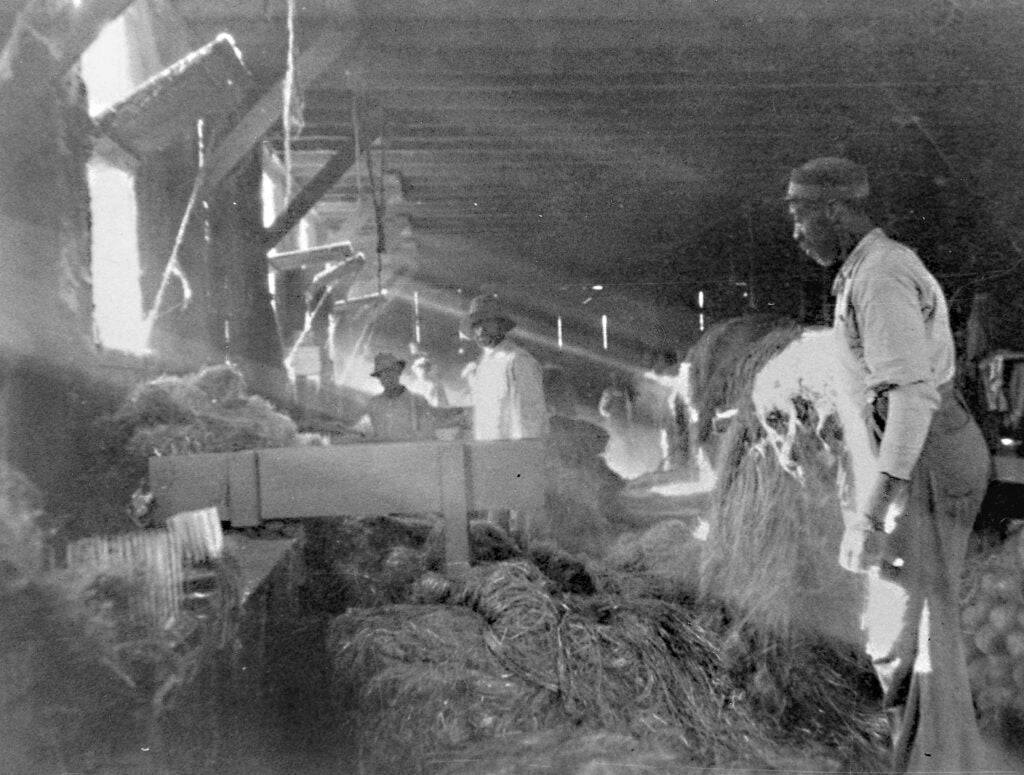One of the industries to experience a sudden growth as a result of the shortage of labor and the demand for hemp was slavery.
Before the war, there were about 2500 slaves in Virginia's Shenandoah Valley.
By 1790 there were 10,000.
Although the demand for hemp declined after the war, rope and cordage were still important commodities and large scale hemp production required manpower.
After Virginia's farmers lost interest in raising hemp due to the drop in prices, Americans in other parts of the country decided to move into the hemp market. Foremost among these new hemp producers were the farmers of Kentucky. And like their neighbors in Virginia, Kentuckians found that the only profitable way to raise hemp was through slave labor.

"Without hemp, slavery might not have flourished in Kentucky. On the hemp farm and in the hemp factories the need for labourers was filled to a large extent by the use of Negro slaves, and it is a significant fact that the heaviest concentration of slavery was in the hemp producing area." writes J. F. Hopkins in his History of the Hemp Industry in Kentucky.
Kentucky hemp growers estimated that three slaves could cultivate about fifty acres. This resulted in a yield of about 35,000 pounds of fiber and a return of about thirty-five dollars per acre.
Many slaves preferred working on hemp fields instead other kinds of labor since it was task work. Under the task system, the slave was given a fixed amount of work for the day. If he finished his work, he could spend his remaining time as he wanted. A slave could even earn money on the task system, although his wages were minimal.
For every pound of hemp over the 100 pounds he was required to break per day, the slave was paid one cent. A good worker could break about 300 pounds, so it was possible to earn about two dollars a day. Some slaves earned enough money in this way to buy their freedom. Under the gang system, which was more common in the cotton fields, slaves worked in groups under the watchful eye of a driver whose job it was to get as much as possible out of each field.
Labor in the hemp factory was also task work. A northern visitor to a Lexington ropewalk in 1830 wrote that there were "60 to 100 negro slaves, of all ages," working in the factory and they were "all stout, hearty, healthy and merry fellows, some of whom contrive to while away the time and drown the noise of the machinery by their own melody."

One of the many slaves who worked in the Kentucky rope factories and who later wrote about his experiences was William Hayden.
Born in Virginia in 1785, Hayden was separated from his mother and taken to Kentucky when he was only five years old. In 1803, he was hired out to the owner of a ropewalk in Lexington where he showed himself to be so proficient that he was taken into the foreman's home. It was during this time that he learned to read and write. In his memoirs, which he wrote as a free man in Cincinatti, Hayden boasted that not only was he very good at his work, he was actually "acknowledged to be the best spinner in the country," and when he asked for an increase in his wages to six dollars a year, his request was immediately granted.

Able to go where he pleased, he left the hemp factories of Kentucky and eventually moved to Cincinatti where he spent the remainder of his life working as a barber in his own shop.
Here is an excerpt of a poem written by Mr. William Hayden
WOMAN IN THE SLAVE WORLD.
Woman! thy heart is love--thy form is grace,
Thy smile disarms the bloody hand of strife,
And beauty is enshrined upon thy face,
As gentle maiden, or as faithful wife.
The music and the melody of life;
A beam of mercy, sorrow's tear to dry,
To man with holy influences rife,
On Earth, thou art an angel of the sky.
Light from thine foot-prints shine, and glory from thine eye.
Winter prepares the embryo flowers of spring,
Among the leafless boughs the birds are mute
Again, that the more gladly they may sing;
The rose shall bloom again, the tendrils shoot
And branch in beauty, rich with golden fruit,
But blighted woman blossoms not again;
Dews may not cherish; sun-beams may not boot,
Her angel bowers she never shall regain,
Bright tears may pity shed, her sorrows are in vain.

Leave a comment